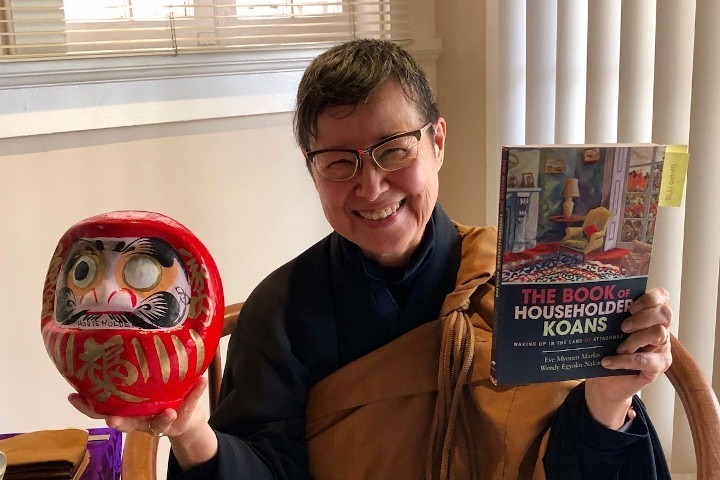
Jackie Gives a Gift
January 1, 2020
by Wendy Egyoku Nakao
The Book of Householder Koans: Waking Up in the Land of Attachments by Roshi Eve Marko and me will be published by Monkfish Publishers on February 4, 2020. To mark the occasion, the following householder koan on giving is presented here. Roshi Eve and I express our gratitude to those who contributed stories and supported this project.
Jackie Gives a Gift
The giver is empty,
The receiver is empty,
The gift is empty–
So why am I suffering so much?
Koan
When Jackie was about to receive the Zen Buddhist precepts, her teacher told her that the ceremony included bows to her parents. Jackie blurted out that years ago she had sent her father a hundred dollars. Her mother had always cautioned her not to send him money because “he would only drink it.” Upon receiving the money, her father bought a case of whiskey. He drank the entire case, was hospitalized, and died. Jackie spent years on a psychologist’s couch over this.
Her teacher listened, gave a small nod of his head, and said, “That was giving.”
Upon hearing this, Jackie was healed.
Reflection
With what heart do you give? With what heart do you receive?
Jackie gave her father a gift and the way he used it brought her years of anguish. The Ten Grave Zen Precepts continually remind us that not only should you yourself not drink alcohol and cloud the mind, but you are also admonished not to create an environment for others to become drunk and cloud the mind. While Jackie’s guilt and sense of responsibility for her father’s death were understandable, what in her teacher’s response–That was giving–ultimately freed her from her years of anguish?
In Zen, it is said that the giver, the gift, and the receiver are all empty of any fixed sense of you and me, of expectation and fulfillment. In the realms of the intrinsic nature of life, there is no you who gives, no you who receives, and no gift that is given–there is only energy circulating. Giving based on self-interest, driven by a personal agenda, is fraught with suffering. Giving practiced unconditionally, on the other hand, aligns you with the dynamic, interdependent flow of the life force that is beyond you and me.
What does this mean for how you are giving? You would naturally consider the time, person, place, and amount in order to give an appropriate gift. Even giving in this considered way, however, requires awareness and discipline in order to detect subtle self-interest. Perhaps you are plagued with a crazy-making inner dialogue: How will this gift make me look? What will I lose by giving this gift? Will I regret giving it? So tell me, how do you give with complete relinquishment? Was Jackie wrong to give her father a hundred dollars? Was a hundred dollars the wrong gift to give her father? Was her father wrong to use the gift as he did?
One day I was sitting in a restaurant when a homeless man came in and went to each table asking for change. As I watched him circle through the entire restaurant, I placed some coins on my table. When he came my way, he took the coins, we nodded to each other, and he left. A restaurant patron came up to me and yelled, “Why did you give him money? Don’t you know what he is going to do with it?” “No,” I replied, “I don’t know what he will do with it, and I don’t care, either.” “What?” yelled the irate patron. “You don’t care?!” He stormed away from my table in frustration and disgust. As the other diners returned to their meals, I sat there surprised at my own responses.
When does a gift become a gift–when it is given, when it is received, or when it is received and given away again? Nature is perhaps the best manifestation of relinquishment. Air circulates freely throughout the earth, rain falls equally on plants, and we absorb oxygen released by plants without inhibition. Just as your life helps to sustain the lives of others, the reverse is also true. In this continual cycle of giving and receiving, you are naturally aligned with the basis of the bodhisattva life, the perfection of giving. At what point does giving become conditional?
Can the true impact of a gift ever be known? When the young girl cow herder, Sujata, saw a suffering ascetic, she offered him a bowl of milk curds. The ascetic drank it, sat under the bodhi tree, and became enlightened, a Buddha. That gift made its journey through the next forty years of the Buddha’s life as he led others to awakening. Here, now, centuries later, that bowl of milk curds continues to give life to you and me. Receiving it with gratitude and sharing it with others is the gift’s journey; Jackie’s teacher used it to free her. Perhaps this gift will end its journey when all beings are liberated. May it be so.
What expectations do you attach to giving? With what mind do you receive the offerings of others? Of life itself? Identify a transformative gift. Can you trace its journey?
Roshi Egyoku is the Head Teacher and Abbot Emeritus of ZCLA.
